CIA Sponsored Terror, Civil Liberties, Criminalizing Dissent, Gaza, Habeas Corpus, Human Rights, Iran, Targeting Muslims
Podcast: Play in new window | Download
Updates:
—–
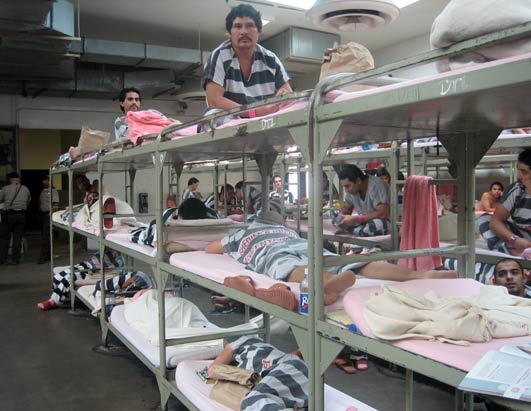
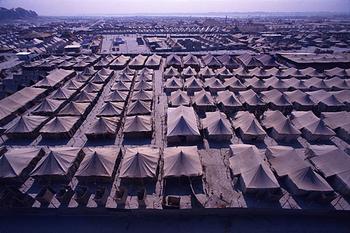
A Challenge to a Brutal Anti-Latino Law
Sheriff Joe Arpaio recently went on trial in Arizona for discriminating against Latinos and for usurping federal authority with roundups of undocumented immigrants. In a related action, a coalition of groups is asking a federal court to block enforcement of Section 2(B) of SB 1070, the Arizona law that compels all law enforcement agencies in that state to enforce the Arpaio model.
In June the Supreme Court rejected the premise of SB 1070 on grounds that making foreign policy – of which immigration law is a part – is a federal government’s domain. However, the Court upheld the law’s “show me your papers” section that requires officers to check the immigration status of anyone they stop, arrest or detain on another basis if the officer has a “reasonable suspicion” the person is in the country illegally.
The motion to block Section 2(B) “involves additional claims, evidence, and irreparable injuries beyond what the Supreme Court had before it.” The challenge explains harms so obvious and unconstitutional that the judge does not need extensive proof of the section’s impact to enjoin it. The Legislature “explicitly intended Section 2(B) to codify the practices” of Arpaio, the motion says, even after his powers had been restricted by earlier investigations into and challenges to his racial profiling. The practices include prolonged stops and detentions of Latinos to check their status or for other immigration-related purposes.
The plaintiffs are also asking the court to enjoin another Arizona law, which turns alleged violations of a federal anti-harboring law into a state crime. Courts have enjoined similar laws in Georgia, Alabama and South Carolina since, like Arizona’s, they were clearly pre-empted by federal law.
Lena Graber:
- The law enforcement in Joe Arpaio’s district have been really outspoken about their intention to stop Latinos and fight immigration.
- The issues around racial profiling are really huge. I think it’s worth separating out the different lawsuits that are going on.
- Sheriff Joe Arpaio runs this incredibly punitive jail where they barely feed people enough it’s a 120 degrees, and he’s been sued literally thousands of times for the conditions of his jail.
- Thats been going on since he was elected in the early nineties.
- In the last several years he’s really gotten on this tough on immigration, let’s do sweeps through the Latino neighborhood.
- The ACLU and other civil rights groups filed a lawsuit against him for racial discrimination, violation of equal protection, and violation of civil rights.
- They filed that 2007, about six months later the Department of Justice initiated a civil rights investigation into Joe Arpaio and his operations in Arizona.
- In the meantime the state of Arizona passed SB 1070.
- There are both civil rights groups and non profits filing one lawsuit and the federal government filing a parallel.
- The Arizona Supreme Court recently ruled on the Arizona law, not on Joe Arpaio, where they struck down most of the law and upheld “show me your papers.”
- The federal government did not argue that the law was unconstitutional because of racial discrimination.
- Litigation tends to effect the way law enforcement operate pretty dramatically.
- Joe Arpaio has been elected five times.
- The federal government has been very slow on the game to chastise Joe Arpaio.
- The Department of Homeland Security formed their largest 287G agreement with Sheriff Joe for his deputies to be trained to enforce federal immigration law. At that point the violations really started to go through the roof.
Guest – Lena Graber, a Soros Criminal Justice Fellow who focuses on detention and deportation and state and local enforcement. Lena Graber’s work seeks to reduce the government’s abuse of immigration detainers–a tool used to maintain custody of potentially deportable individuals in local jails or prisons nationwide. Lena previously worked at the National Immigration Forum in Washington, D.C.
—–
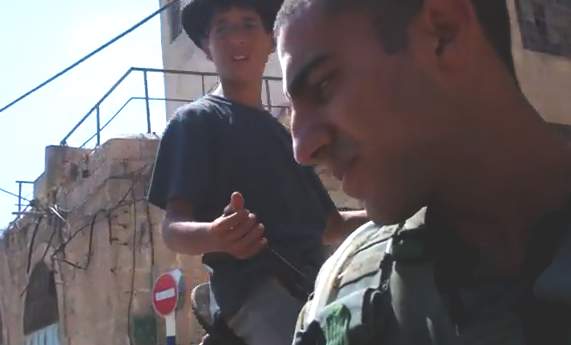
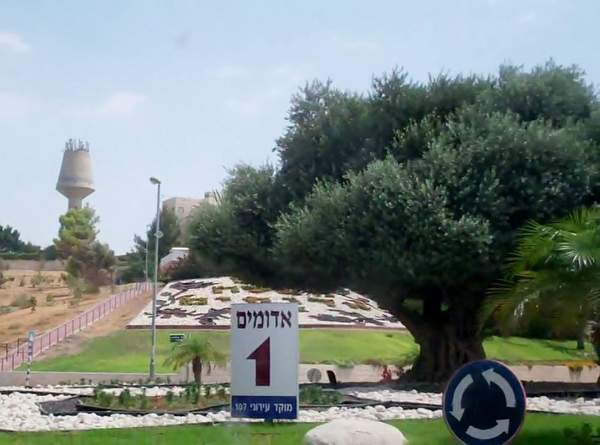
Mondoweiss: Israel Trip and the Future of Palestine
We welcome back returning guest Philip Weiss, the founder and co-editor of Mondoweiss.net, a news website devoted to covering American foreign policy in the Middle East. Philip has recently returned from a trip to Israel and was struck by the ongoing apartheid against Palestinians. During his trip, he traveled an Israeli’s only road. He saw the massive barrier in the West Bank. He toured many Israeli settlements, such as Ma’ale Adumim, the first settlement to be declared a city. Interestingly Philip also saw some of the fund raiser entourage of Republican presidential candidate Mitt Romney while in Jerusalem. We talk with him about his trip and the future of the Palestinian state.
Philip Weiss:
- The last few times I’ve come back I felt a real sense of bleakness.
- When you’re there and you see just how much force is arrayed on one side and the status quo is of complete inequality.
- The sense of martial law is overwhelming. Spiritually, it’s awful.
- When you’re over there you see there is very little left in terms of contiguous territory in the West Bank to create a viable state.
- You see the settlements all around you, giant swimming pools next to villages with walls around them, to separate themselves from Palestine villages in occupied land.
- Jeff Halper says the 2 state solution is dead.
- Area C is ours they say.
- I saw one ad on my commute here today that read – It’s Not Islamaphobia to Blame Islam for Terrorism.
- This is extremism, it’s intolerance, it’s racism.
- It’s statements that we would not accept, that have become off limits in American discourse in almost any other context.
- One thing I saw there was the separation, the complete separation of two societies.
- You really get a sense of ethnic purity at work.
- The denial of that humanity is so profound and offensive.
- I’ve been struck by the famous Arab hospitality in that region.
- The sense of sovereignty and domination is profound.
- It’s hard sometimes to meet people’s eyes, because you know that you’re an author of their humiliation and this human being with a lot of dignity has suddenly become humiliated before your eyes and it’s upsetting.
- John Brown said the idea that all people are created equal is the exact same idea as do unto others as you would have them do unto you.
- It’s kinda scary to think that a bunch of Americans to send a signal to Obama would have to go raise a million dollars at the King David hotel in Jerusalem and have Romney talk about Iran and he’s with Netanyahu on Iran. These were powerful political signals being sent while I was there.
- I think Romney is behaving in an irresponsible manner. It seems like he’s being used in this situation. Within the Israeli security establishment there is some sense it does not want this attack.
- They don’t care about Iran, they care about cleansing the West Bank of Palestinians.
- If there is a war with Iran it’s a perfect opportunity and a crisis to push more Palestinians out of area C into the cities.
- I’m for BDS. Every time I go there I’m upset by what I see. The question is that whether the South African connection is kicking in. (BDS Collective)
- I get a lot of criticism from Jews for exposing my people to danger.
- Jeff Halper studies the occupation and knows it in a granular way.
Guest – Philip Weiss, founder of Mondoweiss, longtime journalist and regular contributor to the Nation and a fellow at the Nation Institute. Philip is the author of two books a political novel, Cock-A-Doodle-Doo, and American Taboo, an investigative account of a 1976 murder in the Peace Corps in the Kingdom of Tonga. Weiss is one of the editors of The Goldstone Report: The Legacy of the Landmark Investigation of the Gaza Conflict.
————————————————————————–
Civil Liberties, Criminalizing Dissent, Gaza, Guantanamo, Habeas Corpus, Human Rights, Prosecution of the Bush Administration, Supreme Court, Surveillance, Targeting Muslims, Torture, Truth to Power, War Resister
Podcast: Play in new window | Download
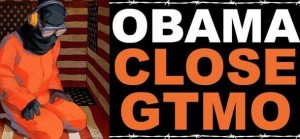
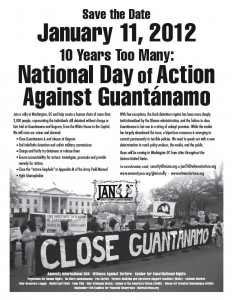
Ten Year Anniversary of Guantanamo Bay Prison
Co-host Michael Ratner and president emeritus of the Center for Constitutional Rights gives listeners an overview of the habeas corpus legal battles to close Guantanamo Bay prison and an in depth look at the corrosive effect the offshore prison has had on civil rights, and the U.S. Constitution. Despite the fact that the U.S. government has itself cleared more than half of these men for release, and despite President Obama’s promise on his second day in office to close Guantánamo within a year, it has been almost twelve months since anyone has been released.
This is the longest period of time that has elapsed since the prison’s opening without a single person being set free.The Obama administration has also extended some of the worst aspects of the Guantánamo system by continuing indefinite detentions without charge or trial, employing illegitimate military commissions to try some suspects, and blocking accountability for torture.
—-
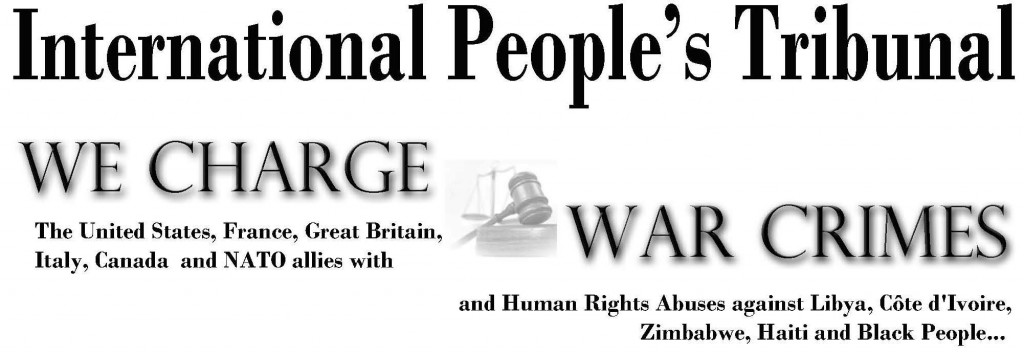
International People’s Tribunal on “War Crimes and Other Violations of International Law
International People’s Tribunal on “War Crimes and Other Violations of International Law” to be held on January 14, 2012 at 12 pm at Columbia Law School. The event will provide an excellent opportunity for students interested in gaining an understanding the theory and the practical application of international law in the real world.
Attorney Roger Wareham:
- The genesis of the tribunal began during the intervention in Libya.
- Back in May the December 12th movement always has a celebration of Malcolm X’s birthday, May 19.
- This is part an ongoing campaign to re-colonize the African continent.
- Libya was important to that for a number reasons. Libya has some of the best crude oil in the world that requires the least amount of production in terms of transforming it into gasoline.
- Col. Gaddafi stood for the proposition that there would be a United States of Africa.
- Libya had the highest standard of living on the African continent.
- What we hope to come out of this is fashion a petition to take before the International Criminal Court.
- The plan is we’ll going to take at least a 400 people strong delegation to the Hague in June to present a petition to the prosecutor, requesting they prosecute the heads of NATO, Britain, Canada, Italy, for war crimes.
- Saturday January 14, 2012 / Columbia University Law School / 435 West 116th Street / 718-398-1766 / iptribunal2012@gmail.com
Guest – Roger Wareham, lawyer and political activist of over four decades. He is a member of the December 12th Movement, an organization of African people which organizes in the Black and Latino community around human rights violations, particularly police terror. Wareham is also the International Secretary-General of the International Association Against Torture (AICT), a non-governmental organization that has consultative status before the United Nations.
—-

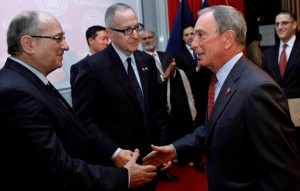
Cornell and The Technion of Israel To Build Campus On Governor’s Island
As many listeners may know, Cornell University is joining with Technion-Israel Institute of Technology in a plan to build a campus in New York City. Critics however, point out Technion’s involvement with the Israeli Defense Force in the development of repressive technology that would further perpetuate crimes against Palestinians. Through cooperative research with Israeli defense companies such as Elbit, Rafael, McGill and Concordia, Technion is involved in asymmetrical robotic warfare with faceless human targets who can be killed by remote control.
To talk more about this, we’re joined today by David Klein, a professor at California State University in Northridge and a member of the Organizing Committee of the U.S. Campaign for the Academic and Cultural Boycott of Israel.
Professor David Klein:
- It is a collaboration between Cornell University and Technion which is like Israel’s MIT.
- There’s a 350 million dollar grant from a philanthropist, which has been supplemented with 100 million dollars in public money.
- I’m a member of the Organizing Committee of the U.S. Campaign for the Academic and Cultural Boycott of Israel.
- The demands that we have are ending the occupation and colonization all Arab lands and dismantling the apartheid wall.
- Recognizing the fundamental rights of Arab / Palestinian citizens of Israel to full equality.
- Respecting and promoting the rights of Palestinian refugees to return to their homes and property as stipulated in UN resolution 194.
- Technion is deeply complicit with Israel’s military and provides the military with technology to carry out ethnic cleansing of Palestinians.
- Participants in a joint military and university program for science students, who will later be integrated into the Army’s research and development units, wear uniforms throughout their years of study.
- It’s particularly strong in developing robotic weapons systems, which include aerial drones, and unmanned combat vehicle technology.
- I think Bloomberg is supportive of the apartheid system in Israel. He wouldn’t view this as a problem like much of the rest of the world does.
- The crime of apartheid is an international crime against humanity.
- In addition to aerial drones, Technion makes the Black D9 Bulldozer, it makes the Stealth UVA Drone, which is a drone that can fly almost 3000km without refueling.
- It’s making something called the Dragonfly UVA mini-drone, which is a tiny drone with a 9 inch wingspan. It can fly into people’s bedroom windows and kill em.
- Technion is involved in asymmetrical robotic warfare with faceless human targets who can be killed by remote control.
- Israel is arguably the most racist country at this time, due to the apartheid system that it has.
Guest – David Klein, member of the Organizing Committee of the U.S. Campaign for the Academic and Cultural Boycott of Israel (www.usacbi.org), and is a professor of mathematics at California State University, Northridge (CSUN). He received his Ph.D. in Applied Mathematics from Cornell University. His professional interests include mathematical physics, climate science, and mathematics education in the public schools. He is the faculty advisor for the campus student groups, Students for Justice in Palestine and the CSUN Green Party. David Klein’s website
——
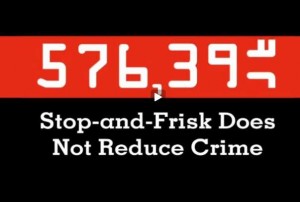
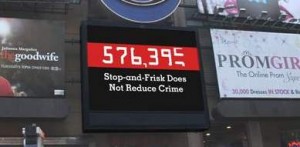
CCR Lawsuit: Stop and Frisk NYC
Last year, a federal judge rejected a move by the City of New York to stop a lawsuit filed by the Center for Constitutional Rights challenging the New York City Police Department’s Stop and Frisk policy. Judge Shir Scheindlin pointed out the seriousness of numerous claims that the NYPD disproportionately and illegally targeting communities of color. In 2009 New York City, a record 576,394 people were stopped, 84 percent of whom were Black and Latino residents — although they comprise only about 26 percent and 27 percent of New York City’s total population respectively. The year 2009 was not an anomaly. Ten years of raw data obtained by court order from the New York City Police Department (NYPD) show that stop-and-frisks result in a minimal yield of weapons and contraband.
Attorney Darius Charney:
- Stop and Frisk is a city wide epidemic. We’ve gone from 90 thousand in 2002 to 700 thousand this year. They’re stopping 2000 people a day, primarily young males of color but also females of color.
- There are really know criteria as far as we can tell. There are guidelines that have been laid out by the courts in the last forty years. The police don’t follow those guidelines. They’re suppose to reasonable suspicion of criminal activity.
- They’re stopping people for what’s called “furtive movements” whatever that means.
- The other one is “high crime neighborhood.” The court had ruled that this is unconstitional, you can’t use the basis of a high crime neighborhood to stop and search them.
- Yet again, the police are doing that hundreds of thousands of times a year.
- The two allegations we made is that the NYPD has a widespread policy and practice of stopping and frisking New Yorkers without reasonable suspicion which violates the fourth Amendment of the Constitution and then on the basis of race which violates the Equal Protection clause of the 14th Amendment of the Constitution.
- The blacker or browner that neighborhood is, the more stops that are going to be done in that neighborhood.
- The other part is the weapon recovery rate, the police department justifies this program by saying, we’re trying to get guns off the street.
- Last year in 2010, they stopped over 600 thousand people. The number of guns recovered in those 600 thousand stops was 1200 guns.
- Relief sought in class action suit: Outside independent oversight of the police department.
Guest – Darius Charney, senior staff attorney in the Racial Justice/Government Misconduct Docket. He is currently lead counsel on Floyd v. City of New York, a federal civil rights class action lawsuit challenging the New York Police Department’s unconstitutional and racially discriminatory stop-and-frisk practices, and Vulcan Society Inc. v. the City of New York, a Title VII class action lawsuit on behalf of African-American applicants to the New York City Fire Department which challenges the racially discriminatory hiring practices of the FDNY.
——————————————-
CIA Sponsored Terror, Criminalizing Dissent, Gaza, Human Rights, Targeting Muslims, Torture, Truth to Power
Podcast: Play in new window | Download
Updates:
—–
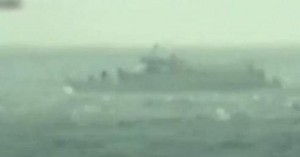
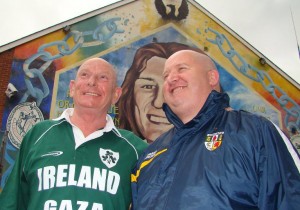
US Boat To Gaza Violence November 2011
Earlier this month, two civilian boats destined for the Gaza Strip and carrying medical cargo set sail from Fethiye, Turkey. As many listeners may know, the boats, one Canadian (“Tahrir”) and one Irish (“Saoirse”), carried 27 people–including journalists and crew—from nine different countries were met with a violent take over by Israeli military. The crew of both boats were attacked by high pressure hoses, there was heavy damage. The crew of the Canadian boat were beaten and tasered. Passengers remain in the Givon detention center. President Obama says the passengers are defying Israeli and American law. Past Law and Disorder shows last year’s flotilla. June 7, 2010 / June 21, 2010 / October 2010 / June 13, 2011
Felice Gelman:
- Some are still in prison, the process of getting people out is very opaque. The Israeli courts told them if they wouldn’t sign a false confession, to confess they had entered Israel illegally that they could be held for 2 months in jail. There were 18 people still left in Israeli jail.
- I would like to point out that this is exactly what happens to Palestinians every day.
- There are more than 6 thousand Palestinian political prisoners who go through this same opaque legal process, tortured. 90 percent of the people who have been arrested by the Israelis, Palestinians, have been tortured.
- Forty percent of the male population at one time has been held by the Palestinians for more than a week. We’re talking about a little over 3 million people.
- It’s endemic process its happening to foreigners at this point. The little kids are hit and shouted at and hooded. I think the Israelis taught the Americans.
- The Israelis are regarded as experts in with what they call terrorists.
- These boats were eagerly anticipated in Gaza. Thousands of people came down to the Gaza harbor and hundreds went out on boats hoping to greet the boats.
- Since 2006 Gaza has been under complete siege and blockade, everything that is allowed in is under Israeli control, almost nothing is allowed out.
- There is no economy, without exports, you really can’t have much of an economy. You’ve got 40 percent unemployment. 90 percent of the population is drinking polluted water because the crucial parts of the water treatment plants have not been allowed in by Israel.
- There’s only one reason Israel has been able to maintain this occupation, and that is because the United States abets it.
- There are no consequences for expanding settlements (from the Obama Administration)
- Right now the Israeli government is trying to get the US to attack Iran.
- Instead of Israel being regarded as an out of control, militarized bully is regarded as a close US ally who should determine our foreign policy.
- Endtheoccupation
Guest – Felice Gelman is with the Steering Committee that organized The Gaza Freedom March and has traveled to Gaza twice since the Israeli invasion.
—–
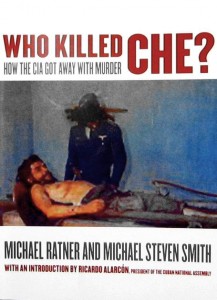
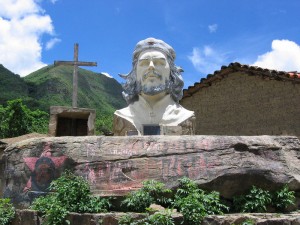
Who Killed Che? How The CIA Got Away With Murder
Co-hosts Michael Smith and Michael Ratner discuss their upcoming book Who Killed Che? A groundbreaking examination based on documents obtained from a Freedom of Information Act requests filed in 1995. This new information helps dispel the stories that the US was not involved with the murder of Che Guevara. Morning Star Review
“Ratner and Smith cut through the lies and distortions to provide a riveting and thoroughly documented history of the murder of Che Guevara. In an era when ‘targeted assassinations’ and ‘capture and kill operations’ have become routine, and are routinely glorified by the mainstream U.S. press, their examination of the U.S. role in Che Guevara’s death could not be more timely.” —Amy Goodman, host and executive producer, Democracy Now.
Michael Ratner / Michael Smith:
- One day when I was a baby I filed a Freedom of Information Act request for all the documents the FBI and the CIA had about Che Guevara.
- You and I had received the first documents 15 years ago and we wrote the first book Che Guevara and the FBI
- Ten or twelve years later I get another document drop from the CIA and these are the documents that are the most important in my view, relating to Che’s killing in Bolivia.
- The government had changed in Bolivia since 1819, 189 times.
- The book tells his story in Bolivia, and what the US did starting the counter intelligence process against him and supported the Bolivian government.
- Michael and I enjoyed working on it because we got to really know Che in a way we haven’t before.
- This book had its origin first in a document drop that was about Che’s murder and Che’s time in Bolivia. There are maps we put in the book of the last battles, where he was captured.
- The idea of the book really came from Michael Smith.
- A lot of people bought the story that was put out by the CIA agent on the ground.
- We demonstrate that the US was deeply involved in his murder.
- Ricardo Alarcon who is the president of the Cuban National Assembly, wrote the introduction to our book.
- During the Cuban Revolution, it was the Bastista troops that killed tens of thousand of revolutionaries.
- The book follows Che when he’s in Africa and various places, but then we have him going to Bolivia on November 5, 1966.
- There was a split between Che and Fidel. Fidel was worried about Che every single day.
- The first half of the book is a 25 thousand word essay by Michael Smith and Michael Ratner. It links together what happened with Che once he left Cuba.
- It’s also a biography of the US counterinsurgency program and the characters in that program that tried to make sure they would stop the Cuban revolution from spreading to other countries.
- We dedicated this book to our friend, the great movement attorney Len Weinglass. Len was the attorney for the Cuban Five.
- The Cuban Five are an important part of this story, 44 years after Che’s death.
- The US has attempted to completely destroy Cuba, and squeeze it so it could not carry out the social and economic reforms that really would’ve made it a shining example for the world.
Hosts – Michael Steven Smith is the author, editor, and co-editor of six books, mostly recently “The Emerging Police State,” by William M. Kunstler. He has testified before committees of the United States Congress and the United Nations on human rights issues. Mr. Smith lives and practices law in New York City with his wife Debby, where on behalf of seriously injured persons he sues insurance companies and occasionally the New York City Police Department. Michael Smith also organizes and chairs the Left Forum. Check out Michael’s blog here.
Host- Michael Ratner NewYork civil-rights lawyer Michael Ratner was in the U.S. Supreme Court yesterday,flanked by the mother of one of the Guantánamo detainees he has represented for the past two years, unsure what to expect. After an hour, he was pleasantly surprised. First, Sandra Day O’Connor, and then Justices Souter, Breyer, Kennedy and even Scalia, indicated through their questions that they were skeptical of the government’s argument that the men Defense Secretary Donald Rumsfeld calls “the worst of the worst” have no legal right to file habeas corpus petitions in U.S. courts.
—————————————————
CIA Sponsored Terror, Civil Liberties, Gaza, Human Rights, Targeting Muslims, Truth to Power
Podcast: Play in new window | Download
Updates:
—

US to Gaza: Flotilla 2011
The Turkish Islamic group, IHH The Foundation for Human Rights and Freedoms and Humanitarian Relief have organized another flotilla carrying letters of support for the Palestinian people and bring attention to blockade on the Gaza Strip. As many listeners may know, last year’s flotilla ended with the death of nine activists when the Israeli Navy intercepted the Mavi Marmara. Meanwhile, the Israeli Navy is training to confront this years humanitarian effort. Turkish Foreign Minister Ahmet Davuto?lu warned Israel not to “repeat the same mistake” – in using force against the flotilla. Last week, Israeli Deputy Foreign Minister Danny Ayalon said that IHH was deliberately provoking Israel and setting the stage for a confrontation, making it responsible for any clashes that happen, according to an Israeli newspaper. Past Law and Disorder shows last year’s flotilla. June 7, 2010 / June 21, 2010 / October 2010
Felice Gellman:
- I went to Gaza right after the 2008-2009 attack thinking naively that something could be done to rebuild Gaza.
- When I got there, I grew up very quickly and realized the Israeli blockade would prevent any rebuilding from this horrific attack.
- Last year there was a flotilla that sailed at the end of May that was brutally attacked and nine civilians were murdered by Israeli commandos. There will be an American flagged boat and the passengers will be American citizens, and that is to specifically confront the US covert support for the siege of Gaza.
- The flotilla has been very much on the minds of the Israelis because it was not received well to murder nine civilians. One of them was an American citizen and the United States has done near zero to support the family.
- The initial Israeli attack strategy was to use attack dogs and snipers. Israel signed a deal with Cyprus making it the main transshipment point of natural gas from Israels natural gas development out there.
- The next day the prime minister of Cyprus announced he would not allow the flotilla to sail from Cyprus. Israel asked the Greeks not to intervene.
- The idea was to make this as diverse as possible, as representative of America as possible.
- I’ve been to Gaza twice and people say to me over and over, please we want our freedom.
- They’re saying the same thing that people are saying Egypt, Syria, Bahrain. They don’t want to live in a hand out society.
- The Rafah crossing being open doesn’t end the siege of Gaza.
—-
Attorney Richard Levy:
- As an American Jew, I feel a special responsibility to do something around this issue. When Israel first came about and we knew so little about what happened. there. The first reaction was, well this wonderful homeland.
- And then as we grew and the years past and their conduct in the West Bank, their conduct in Gaza, in trapping people, and imposing these horrible checkpoints and settlements that take away the land and take away the water.
- We met with the State Department 2 weeks ago, and pointed out to the State Dept that while the president is applauding peaceful demonstrations across the Middle East, we too are planning a peaceful demonstration.
- Instead of getting a nod and an assurance, we got an email several days later, saying that there was a maritime warning and that people should not go into the zone, everyone can expect interference by the Israelis.
- The thing that is terrible about that we all know if the US said don’t do it, Israel wouldn’t do it. As a recipient of 3 billion dollars annually of US aid, on which it is totally dependent.
- I think the problem with Israel is we’re letting AIPAC be the voice of Jewish people everywhere. We gotta get up and say, they don’t speak for us.
- You take a place like Gaza where more than 40 percent of the population is under the age of 14. It’s kids, its women, they don’t have schools, they don’t have food, they don’t have medical care.
- 90 percent of the people (in Gaza) depend on charitable donations to live at all. The fact that we’re not getting up and being heard on this, is allowing only one voice to be heard.
- And that is a very conservative pro-Israeli voice that I don’t think speaks for the American people at all.
- My optimistic side says we’re going to be massively inconvenienced.
- I think we want to call attention to the Palestinian people that they’re not completely alone. The US boat is going to be carrying a cargo of letters. From Americans to Palestinians saying we understand your plight, we support your effort to live in peace and to live without these horrible restrictions on your life.
- There was so much fear of over reaching by the US government under the Terrorism Support Act that if you brought over the most innocent product, and it found its way into the hands of Hamas, some hyped up prosecutor could go after you in this country under this very draconian statute.
- In Turkey, the Turkish boat had a million applicants to be passengers on this flotilla.
Guest – Felice Gellman, member of the Wespac Middle East Committee and a member of the Steering Committee that organized The Gaza Freedom March. She has traveled to Gaza twice since the Israeli invasion.
Guest – Attorney Richard Levy, a labor and civil rights attorney. (Cornell, B.A., 1964, NYU School of Law, J.D., 1968) is a senior partner at LR. He has practiced labor, employment, employee benefits and civil rights law since 1971. During law school he was associate editor of the Annual Survey of American Law. A member of the United States Supreme Court Bar, Levy has lectured at conferences for the NLRB, AFL -CIO, Practicing Law Institute and has published articles on labor law and civil rights litigation. He has served on the Lawyers Advisory Panel of the AFL – CIO.
—
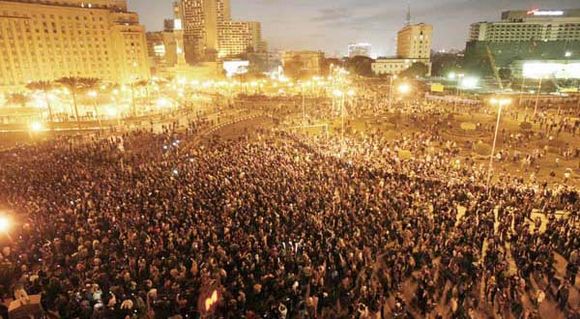
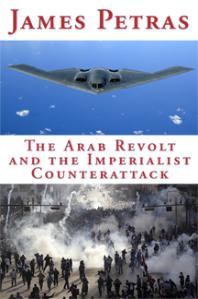
The Arab Revolt and the Imperialist Counterattack by Jim Petras
The Arab Revolt and the Imperialist Counterattack is the title of Jim Petras’ timely new book. It was rushed to print and chronicles the growing militarization of US policy in North Africa and the Gulf region. The essays also give an important historic narrative of the long over due Arab democratic revolution and the popular uprisings. Now as the empire’s crumbling dictatorships began to spread, the United States, France and the UK race to intervene. NATO is deployed using its new “responsibility to protect” doctrine authorizing “humanitarian intervention.”
Professor James Petras:
- Obama supported Mubarak since he (Obama) entered office, and only when it was absolutely clear there were millions of people in the street, the military was divided, there was absolutely no future for Mubarak, Washington then began to leverage Mubarak into a departure which would retain the entire economic, police and military apparatus intact.
- Essentially, sacrifice the dictator to save the neo-liberal, pro-Israeli state.
- The Egyptian economy has been part of a pillage, the US has been giving Egypt, 2 billion a year for decades. This is bribe money so that Egypt will continue collaborating with Israel in keeping the Palestinians under Israeli control.
- Participating in the blockade of Gaza. That’s part of the economy. The other part is that Mubarack family and cronies have essentially run the economy into the ground.
- Egypt draws its income from the Suez Canal, tourism, visiting the pyramids, on a minor scale, agriculture and textiles. But there are enormous disparities in wealth, the per capita of about 40 percent of Egyptians is 2 dollars per day.
- Egypt has a handful of billionaires all organized around the regime.
- It’s a big country with great potential but it was run into the ground by this corrupt family dictatorship.
- The picture now is the ousting of Mubarak has not amounted to substantial change in the governing class. Essentially, the military took over and kept many of the Mubarak personalities in position of power. The minister of the interior is still there, the generals are still there. They’ve been arresting and disappearing some of the pro-democracy people.
- The struggles in Egypt haven’t ended. The Washington Post and the New York Times keep talking as if the democracy process has reached its culmination.
- The surveys show that a vast amount of Egyptians want to renegotiate the arrangement the Egyptians had with the Israelis.
- This is a hot potato because the military wants to continue to get the hand outs from the US.
- The Egyptian military is trying to make a deal with the Muslim brotherhood, especially the elder statesmen.
- There is an attempt here to substitute elections for social changes and economic improvements.
- The business men who’ve been so accustomed to having everything their way are calling on the military to clamp down. To arrest the strikers. There’s been a proliferation of strikers in the hotel industry, manufacturing, public employees.
- We don’t read about those unless you go into some of the Egyptian newspapers.
- The Obama Administration and the Europeans are going to pump in 2 billion dollars on condition that these social reforms are not carried out. That there isn’t any effort to redistribute income. Washington is jumping in at this moment with taxpayer’s money to try to head off any real democratization that effects the great majority of the people.
- You have an opposition that’s divided, you still have the old patronage apparatus of Mubarak. Mubarak had a program of hand outs, never any substantial changes in people’s condition.
- On Libya: This is a war on Libya with the United States and Europe, there’s no question about it.
- The issue here is that Libya has enormous oil and gas wells. We are trying to control Africa through our military operations, while the Chinese are in there making massive investments, establishing economic presence which far surpasses what Washington can imagine.
- This costs the tax payers billions. We don’t get anything back. This isn’t an investment into a coal mine, or diamond mine where you would get returns.
Guest – James Petras, author and former Professor of Sociology at Binghamton University, New York.
—————————————-
Civil Liberties, Criminalizing Dissent, Gaza, Human Rights, Targeting Muslims, Truth to Power
Podcast: Play in new window | Download
Updates:
——
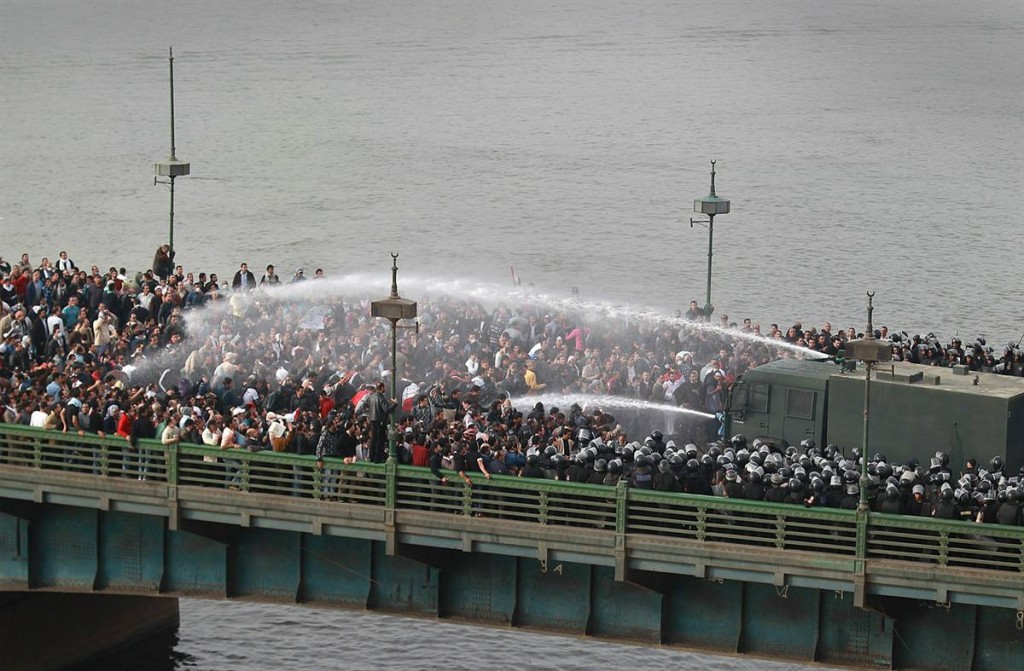
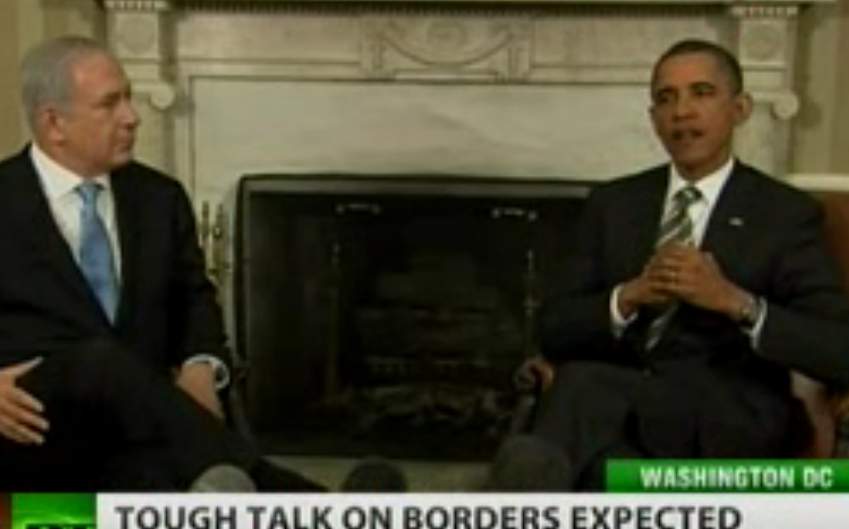
Middle East Update: Egypt, Israel and the United States
Labor strikes continue in Egypt as tourism declines and the crime rate increases. There have been many strikes including Egyptian police unions who are demanding higher wages. We’re joined by writer and Middle East activist Phyllis Bennis. She is the director at the New Internationalism Project at the Institute for Policy Studies. Phyllis has recently returned from Egypt and she joins us today for an update and analysis. Update on Egypt Gaza Border
Phyllis Bennis:
- The trip to Egypt merged my work with the Israel-Palestine issue and my broader work in the region of US policy towards the Arab Spring.
- There are no guarantees that the incredible accomplishments of the Arab Spring will lead to the new democratic opening in Egyptian society let alone the Egyptian economy, that people are working for.
- Everybody agrees that the wall of fear that made possible the kind of Mubarak dictatorship, that led to the collaboration of Egypt and Israel, under US auspices in repressing Palestinians and imposing the siege on Gaza, that that’s no longer going to be possible.
- The widespread use of arrests and torture, torture was far more prevalent and routine in Egypt. I’ve studied the region for years, and I didn’t know how ordinary it was.
- Every sector in society in Egypt, were engaged in meetings. Women’s organizations, privacy rights groups, trade unions, the labor movement.
- There’s a lot of fear, but also a sense of excitement in the ability for people to fight back and new levels of unity across sectarian lines, across generational lines, across class.
- The question of the role of the US remains very key. Egypt’s new foreign minister Nabil al-Arabi, says the siege of Gaza must end. Permanently opening the border to Gaza.
- Egypt’s military will play a role in the border to Gaza. Now the foreign minister position is up for grabs again.
- The media in Egypt is overwhelmingly in Arabic. Al-Aron, the flagship daily newspaper in Egypt, longest state run newspaper, now reflects the interest and approach of the new government.
- Regarding elections, I don’t think there was a unified left position and a right.
- If the elections were held soon, there is a sense that Mubarak’s NDP, National Democratic Party and the Muslim Brotherhood, those existing parties would trounce everyone else.
- Many support quick elections which are due to be held next month.
- Anytime you have a progressive revolutionary process underway that’s being guaranteed by the old military, you’re kind of in trouble.
- I heard one Egyptian commentator exalted about one of Mubarak’s son being in the same jail cell that he spent many months in. This has not been a economic revolution, we have not seen an overturning of the neo-liberal economic policies.
- Israel and Palestine: The code for land swaps is that Israel gets to keep the 3 main settlement blocks as a starting point.
- We’re talking 40 percent of the land in the West Bank. Obama’s soaring rhetoric, “we stand with the impoverished fruit seller in the streets of Tunisia, rather than with the dictator”
- Obama’s main challenge was how do we position ourselves to be a friend of democracy while maintaining our strategic alliances with the existing dictators.
Guest – Phyllis Bennis, directs the New Internationalism Project at IPS. She is also a fellow of the Transnational Institute in Amsterdam. She has been a writer, analyst, and activist on Middle East and UN issues for many years. In 2001 she helped found and remains on the steering committee of the U.S. Campaign to End Israeli Occupation.
—–
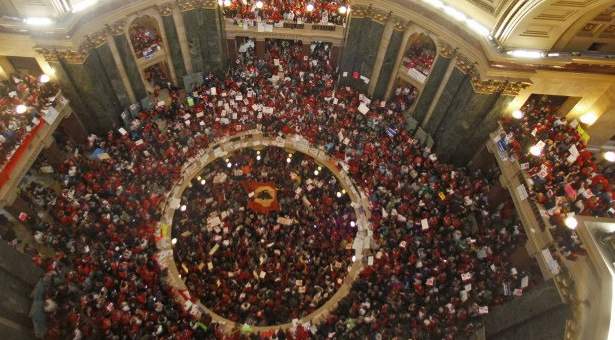
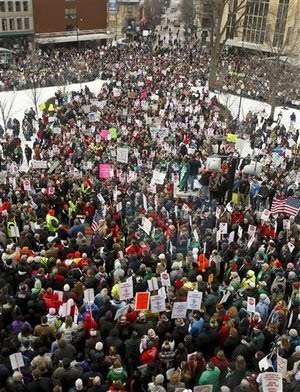
Resistance Maintains In Wisconsin
Protests continue in Wisconsin against the union busting bill signed by Governor Scott Walker in March. The demonstrations are also aimed at the anti-people measures contained in the budget proposal that would cut more than 3.5 billion dollars from services that help the poor and working class. There is still a chance that this bill will not become law. An injunction is in place because of the people’s massive resistance. The movement demands are full legalization for immigrants, oppose budget cuts, keep in state tuition for immigrant students and oppose any legislation that targets immigrants in Wisconsin.
Professor Paul Buhle:
- The new governor announced drastic changes under the “budget repair” bill. Virtually a bargaining rights of public union employees would be rescinded.
- Basic environmental laws would be repealed, and communities that came up with a minus budget would fall under the control of political appointees who could replace them.
- As this was attempted to being passed in the Senate, 14 Democrats fled the state and remained sequestered for a couple of weeks.
- While in Madison, crowds ranging from 1000, to 100 thousand, circled the Capitol on an almost daily basis, and sat in, slept in on the Capitol rotunda for 2-3 weeks.
- As in other states and in Congress, the Republicans insist that pay and benefits of public workers were greater than those in private sector, factories have fled and private sector workers are doing so much worse,
- The idea of public unions was illogical and needed to be cut back because they were a powerful voting block.
- The response from the unions was if belt tightening is necessary we expect everyone to do it, but don’t take away our bargaining rights and our basis for dignified labor.
- Not when huge tax benefits are being delivered to corporations. Its not a mystery that the Koch Brothers from Kansas were the major backers of Scott Walker’s campaign. They set up an office only a block from the Capitol. They are very likely the architects of the ideas and the plans.
- Public resources are being sold off with no bid contracts.
- Both sides are geared up around current and ongoing legal processes that are beyond the ken of the ordinary Wisconsinites.
- Some members of the Democratic party were not happy with the mass demonstrations.
- Wisconsin protests effected most emphatically Ohio, Pennsylvania and New Jersey, Maine.
- There has been an occupation at the Capitol of Washington State It was incumbent to us to show up once a day, some of us twice a day, to march around the Capitol. There’s a deep ambiguity here, on the one hand the Republicans have to be smashed.
- The Obama signs all went down from the yards a long time ago. There’s an ambivalence here, and its reflected nationally.
Guest – Paul Buhle, senior lecturer at Brown University, a historian of American radicals, a former member of Students for a Democratic Society and author of many books including images of American Radicalism, Che, A Graphic Biography, and Isordore Duncan, a graphic biography by Sabrina Jones.
—————————————————-
Civil Liberties, Gaza, Human Rights, Targeting Muslims, Torture, Truth to Power, War Resister
Podcast: Play in new window | Download
Updates
—
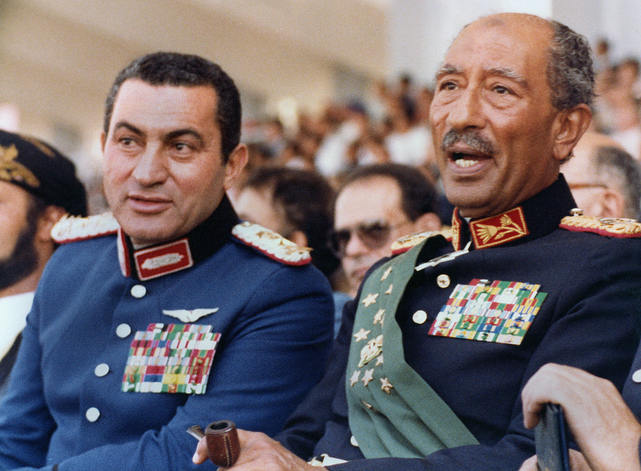
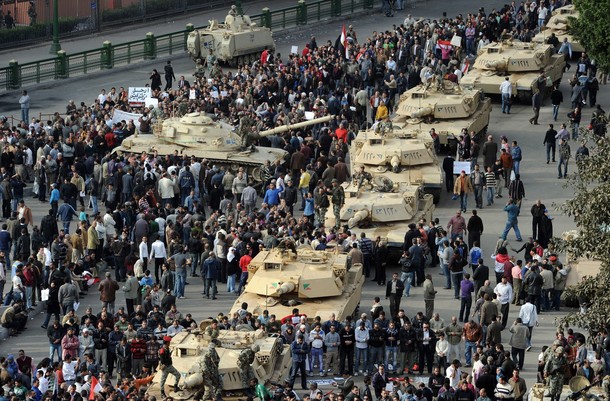
Egypt’s Aftermath and Continued Arab Protests
Civil rights lawyer and former president of the American-Arab Anti-Discrimination Committee, Abdeen Jabara joins co-host Michael Smith in the studio. Jabara gives an update and analysis on the current political and economic shifts in Egypt. Meanwhile Israel recently celebrated the day it declared independence on May 14, 1948, the Nakba. More than 60 years later, Palestinian descendants remain the central issue within the Israeli Palestinian conflict. Last week a wave of coordinated Arab protests hit Israel on 4 of its borders. Protesters were shot and killed when they clashed with Israeli forces at the Lebanon, Syrian, West Bank and Gaza borders.
Abdeen Jabara:
- There’s been a break down of law and order in Egypt, there’s been a rise in the crime rate.
- There’s been a huge drop in income from lack of tourism. There have been various strikes, and even the police went on strike demanding higher wages. People have broken out of various prisons. The situation is very much in flux.
- Two sections of an Egyptian elite maintain control over popular forces.
- There were those that were the nouveau riche, that were being promoted by Gamal Mubarak.
- Many of them have been arrested and are in jail for ill-gotten gains.
- One of the most serious problems in Egypt have been, this neo-liberal development where they were trying to sell off state owned business.
- Open Door Policy, wanting Egypt to become part of the Western camp.
- Will there only be change in a cosmetic fashion where there is no change in the basic relationship with the people. That is the real issue.
- I think a lot depends upon the Army. Egypt is a very poor country and its main sources of income other tourism is the Suez Canal, finished clothes and canned goods.
- Under the Mubarak leadership in order to go on strike you had to get permission from the executive council of the trade union movement. Since the fall of Mubarak, you’ve seen much more labor activism.
- We will be seeing Europe and the United States pouring money into the various formations in the country.
- Israel and Palestine: I think we’re going to see something new now, with all this turmoil.
- We have to understand that the Europeans have been developing some distance on the Middle East issue. The United States and Israel are becoming more isolated in the world. The United States has never been an honest broker in this situation.
- Flotilla will leave in latter part of June, will have ten boats from different European and North American countries. Wednesday May 25, Flotilla Fund Raiser – UStoGaza.org
Guest – Abdeen Jabara, civil rights lawyer and former president of the American-Arab Anti-Discrimination Committee.
——

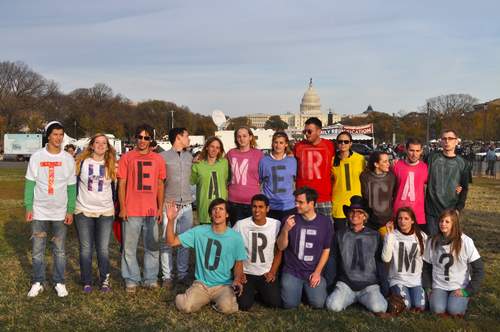
The American Dream As We Know It Is Obsolete
Will the Wisconsin and other state union protests be a catalyst for a general strike? Right now, the Wisconsin demonstrations are aimed at restoring collective bargaining rights for public servants, the goal to a middle class. Reject the opiate of the middle class idealism says our next guest. The revolution must be carefully thought out and be modeled on the ground breaking uprisings in the Middle East and North Africa. How could unions prepare their strategy to include a broader support base? Unions could build alliances with single mothers, the poor, immigrants, the elderly and a wide range of groups.
Arun Gupta:
- It bugged me as all these progressives defended the middle class. I’ve been studying the Tea Party lately. Is the middle class really under attack? The core of the Tea Party is middle class, very entrepreneurial, than more management supervisory.
- There’s a duel movement going on with the Republican attack. Social welfare and public sector jobs.
- In Wisconsin, a population of 5 million, there are 200 thousand public sector jobs
- We should expand our notion of who are defending and what are we fighting for?
- I think Krugman is the most egregious, he says the 1950s was era without great extremes of wealth and poverty.
- Really? There were no Rockefellers and sharecroppers in Mississippi?
- How do we understand the 1950s? We have to go back to the term corporatism. Corporatism doesn’t mean corporation, its derived from corpus meaning body. The government is a mediator between significant sectors of society.
- American capitalism had needed the domestic market. Corporations don’t need internal consumption anymore.
- Capitalism has unmoored itself from geography. For high speed rail in the US, who will build it? The companies that are the most advanced are in China, Germany and South Korea.
- If Obama wanted to spend billions on high speed rail, the US doesn’t have the base, the human intellectual base to compete with Germany and South Korea. We’d have to put tariffs on their goods then you raise the scenario of a trade war.
- Then we’re back in the 1930s which brought on the war. People are not really thinking about the hidden ideologies of green jobs and defending the middle class.
- I’ve seen hopeful potential, these movements pop up and recede so quickly. The immigrants rights movements.
- During revolutions, it is something wonderful, people want to become better people.
- What we don’t hear much about are the little Mubaraks in Egypt, in factories, the workplace, dictators all over the place, and they’re being ousted.
- The Right likes mass movements like the tea party, the Democrats hate mass movements.
Guest – Arun Gupta, Founding editor of the The Indypendent. He recently wrote The American Dream As We Know It Is Obsolete: Why progressives need to think beyond the mantra of creating a “middle class America.”
——————————————————————————

























